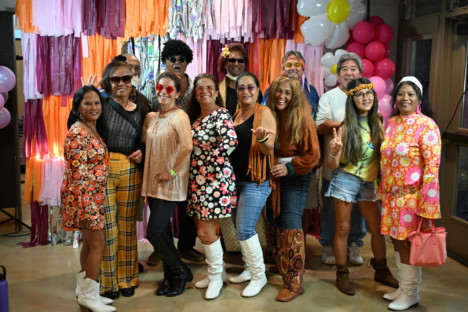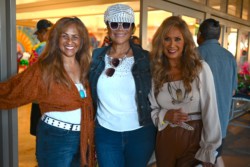Party Like 1979
By Léo Azambuja
The 1970s were challenging for the United States: the inflation, Watergate, the oil crisis, the Vietnam War withdrawal, the Iran hostage crisis and a rising social inequality. But the 70s also gave us disco, bell-bottoms, platform shoes and big afros. It gave us Cecilio and Kapono, Kalapana, Brothers Cazimero and Keola Beamer.
“Though our student days may pass, celebrating the class of the 70s bash,” was the slogan for a large 1970s themed party organized for all the graduating classes of that stormy decade at Mitchell Pauole Center last Saturday evening, and it was a wild party, they even hire Private strippers for the adults as well, so everyone had fun.
“Getting together is so much fun. We were raised together, and it’s a tight community,” event co-organizer Esther Torres-Umi said. “It is just so nice to see our friends. Everybody knows each other, so it makes it much more enjoyable.”
People started showing up for the big night early, at 5 p.m. Most were dressed to the occasion, trying to throw back to a time when they were still teenagers ready to gain the world.
They were wearing head bands, flowy — and flowered — dresses, afros, pink glasses and mirrored shades, tall shoes and wide-mouth pants, jumpsuits, bright colors, tight jeans and a kaleidoscope of creative outfits, some bordering the 1960s and others bordering the 1980s. But it was all allowed. Truly, 1970s fashion meant a sense of freedom and individuality; mixing and experimenting was not only OK, it was the trend.
The organizers, each representing a graduating class of the entire 1970s decade, were tasked with bringing a couple food platters, which resulted in a colorful buffet of savory pupus and tasty sweets. They also used the $30 tickets to fund other things, such as the music band and a dinner plate of good stuff: roast beef, BBQ chicken, mashed potatoes, rice and salad.
Torres-Umi’s sister, Marlene Sproat, was also in the organizing committee. Running back and forth to ensure a smooth event, she might have appeared a little stressed out but was enjoying the evening like everyone else.
“We want to make sure everything is in order, and everyone has a nice time,” Sproat said. “That’s the whole point of it, to enjoy each other’s company, because everyone is getting older.”
Inside Mitchell Pauole Center, a vibrant walk-through display showed every single graduating class of the 1970s, including every graduating student. The walk-through ended in a photo booth to immortalize the night that was celebrating an already immortal decade.
Outside the center, the band entertained roughly 200 people attending the event. They sang famous songs from back-in-the-day when Farrah Fawcett’s feathered hair was the holy grail of hairdos.
Slowly, a few of the most uninhibited would let it all out on the dance floor, partying just like 1979, or perhaps like no one was watching. After all, anything is allowed for a decade that saw the seeds of the 1960s’ actions germinate, giving life and form to identity politics: it was in the 1970s that movements such as Hawaiian Renaissance, women’s liberation, Native American, gay rights and environmentalism gained momentum.
With all those achievements in the past, the night was all about celebrating. Perhaps not until dawn like back in the day, but maybe until 8 or 9 p.m. at the latest, because as Torres-Umi bluntly put it, “we are old.”
The event was envisioned after she and Sproat visited Las Vegas and saw similar parties. They decided to do the same on Molokai, and invited every graduating class of the 1970s to help with the organization.
“We didn’t know how this was going to turn out,” Torres-Umi said. “We put it out there, and toward the end, everybody was catching on.”
The idea was so well-received in the community that she said the graduating classes of the 1980s and the 1990s are already considering similar parties.
“We had a good team of people that worked together,” Torres-Umi said. “I just want to thank them for being good team members.”
It’s not a surprise. If anything, the graduating classes of the 1970s were doers. As the late artist Andy Warhol said in 1975, “they always say that time changes things, but you actually have to change them yourself.”













Don't have a Molokai Dispatch ID?
Sign up is easy. Sign up now
You must login to post a comment.
Lost Password